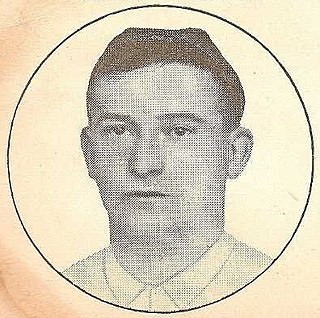
Emlyn Jenkins was a Welsh cinema manager, trainee teacher, landlord of a public house, rugby union, and professional rugby league footballer who played in the 1930s and 1940s, and coached rugby league in the 1950s. He played club level rugby union (RU) for Treorchy RFC, and Cardiff RFC, and representative level rugby league (RL) for Great Britain, Wales and England, and at club level for Salford, Wigan and St Helens, Leigh, as a fullback, wing, centre, stand-off, or scrum-half, and coached club level rugby league (RL) for Leigh and St Helens.
Alan Spencer Edwards was a Welsh rugby union, and professional rugby league footballer who played in the 1930s and 1940s. He played club level rugby union (RU) for Aberavon RFC, the Royal Air Force, and representative level rugby league (RL) for Great Britain and Wales, and at club level for Salford, Leeds, Dewsbury, and Bradford Northern, as a wing.
The 1897–98 Northern Rugby Football Union season was the fourth season of rugby league football.
The 1899–1900 Northern Rugby Football Union season was the fifth season of rugby league football.
The 1901–02 Northern Rugby Football Union season was the seventh season of rugby league football run by England's Northern Rugby Football Union. A number of off-season changes made this season different from preceding ones. In June 1901 fourteen leading clubs from both Lancashire and Yorkshire resigned from their respective County Championships to form a new Northern Rugby Football League.
The 1908–09 Northern Rugby Football Union season was the 14th season of rugby league football in the United Kingdom.
Christopher Brockbank was an English professional rugby league footballer who played in the 1920s, and coached in the 1930s through to the 1950s. He played at representative level for England, and at club level for Swinton and Bradford Northern, as a wing, and coached at club level for Huddersfield and Warrington.
Steve O'Neill is an English former professional rugby league footballer who played in the 1970s, 1980s and 1990s, and coached in the 1990s and 2000s. He played at representative level for England, and at club level for Wigan, Widnes, Salford, and Swinton as a prop or second-row, and coached at representative level for Ireland.

Harry Myers from Horsforth, Leeds was a Rugby Union and later Northern Union footballer who played in the 1890s and 1900s. He played rugby union for Horsforth, Bramley and Keighley and played one international match for England as well representative rugby for Yorkshire. In 1900 he changed codes to play rugby league. He died in 1906 after an accident during a game for Keighley against Dewsbury.
The 1897 Challenge Cup was the inaugural staging of the Northern Rugby Football Union's Challenge Cup and involved 52 clubs from across England from the 1896–97 Northern Rugby Football Union season. The tournament was played over six rounds in March and April 1897, culminating in the final which was won by Batley.
The 1940–41 Northern Rugby Football Union season was the second season of the English rugby league’s Wartime Emergency League necessitated by the Second World War. After doubts that the season might not start, matches were played in a league organised in a similar way to the previous season with two regional leagues, Yorkshire and Lancashire, with the winners of each league meeting in a two-legged play-off final to determine the overall champions.
The 1941–42 Northern Rugby Football Union season was the third season of the rugby league’s Wartime Emergency League necessitated by the Second World War. With fewer clubs than the previous season the Rugby Football League (RFL) decided to amalgamate the two county leagues into one joint league. The season started with 18 clubs but finished with 17 after Broughton Rangers withdrew in January 1942. The single division championship was won by Dewsbury, who had finished the season in first position and then defeated Bradford Northern in the play-off final.
The 1908–09 Lancashire Cup was the fourth year for this regional rugby league competition and saw a final between two previous cup winners. The cup was won by Wigan who beat Oldham in the final at Wheater's Field, Broughton, Salford, by a score of 10–9. The attendance for the final was 20,000 and receipts £600.
Eric Prescott was an English rugby union, and professional rugby league footballer who played in the 1960s, 1970s and 1980s. He played club level rugby union (RU) for Widnes ICI RUFC, and representative level rugby league (RL) for Lancashire, and at club level for St Helens, Salford, Widnes and Runcorn Highfield, as a wing, centre, second-row or loose forward. He was the father of England international rugby league player, Steve Prescott.
The 1905–06 Challenge Cup was the 10th staging of rugby league's oldest knockout competition, the Challenge Cup.
The 1908–09 Challenge Cup was the 13th staging of rugby league's oldest knockout competition, the Challenge Cup.
The 1924–25 Challenge Cup was the 25th staging of rugby league's oldest knockout competition, the Challenge Cup.
The 1927–28 Challenge Cup was the 28th staging of rugby league's oldest knockout competition, the Challenge Cup.
The 1948–49 Challenge Cup was the 48th staging of rugby league's oldest knockout competition, the Challenge Cup.
The 1939–40 Northern Rugby Football League season was an emergency season of English rugby league fixtures necessitated by the outbreak of the Second World War. The regular league season had started at the end of August 1939, but on the outbreak of war all sport was suspended. When government permission for sport to be resumed was given, the league was reorganised into two regional competitions, Yorkshire and Lancashire. The winners of each league playing against each other to decide the overall champions. The Yorkshire competition was won by Bradford Northern who beat Swinton, winners of the Lancashire competition, in the two-legged league final.


